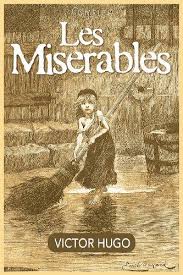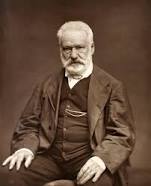Les Misérables Page #6
Les Misérables is a French historical novel by Victor Hugo, first published in 1862, that is considered one of the greatest novels of the 19th century. In the English-speaking world, the novel is usually referred to by its original French title.
It seems as though it were a being, possessed of I know not what sombre initiative; one would say that this piece of carpenter's work saw, that this machine heard, that this mechanism understood, that this wood, this iron, and these cords were possessed of will. In the frightful meditation into which its presence casts the soul the scaffold appears in terrible guise, and as though taking part in what is going on. The scaffold is the accomplice of the executioner; it devours, it eats flesh, it drinks blood; the scaffold is a sort of monster fabricated by the judge and the carpenter, a spectre which seems to live with a horrible vitality composed of all the death which it has inflicted. Therefore, the impression was terrible and profound; on the day following the execution, and on many succeeding days, the Bishop appeared to be crushed. The almost violent serenity of the funereal moment had disappeared; the phantom of social justice tormented him. He, who generally returned from all his deeds with a radiant satisfaction, seemed to be reproaching himself. At times he talked to himself, and stammered lugubrious monologues in a low voice. This is one which his sister overheard one evening and preserved: "I did not think that it was so monstrous. It is wrong to become absorbed in the divine law to such a degree as not to perceive human law. Death belongs to God alone. By what right do men touch that unknown thing?" In course of time these impressions weakened and probably vanished. Nevertheless, it was observed that the Bishop thenceforth avoided passing the place of execution. M. Myriel could be summoned at any hour to the bedside of the sick and dying. He did not ignore the fact that therein lay his greatest duty and his greatest labor. Widowed and orphaned families had no need to summon him; he came of his own accord. He understood how to sit down and hold his peace for long hours beside the man who had lost the wife of his love, of the mother who had lost her child. As he knew the moment for silence he knew also the moment for speech. Oh, admirable consoler! He sought not to efface sorrow by forgetfulness, but to magnify and dignify it by hope. He said:-- "Have a care of the manner in which you turn towards the dead. Think not of that which perishes. Gaze steadily. You will perceive the living light of your well-beloved dead in the depths of heaven." He knew that faith is wholesome. He sought to counsel and calm the despairing man, by pointing out to him the resigned man, and to transform the grief which gazes upon a grave by showing him the grief which fixes its gaze upon a star. CHAPTER V--MONSEIGNEUR BIENVENU MADE HIS CASSOCKS LAST TOO LONG The private life of M. Myriel was filled with the same thoughts as his public life. The voluntary poverty in which the Bishop of D---- lived, would have been a solemn and charming sight for any one who could have viewed it close at hand. Like all old men, and like the majority of thinkers, he slept little. This brief slumber was profound. In the morning he meditated for an hour, then he said his mass, either at the cathedral or in his own house. His mass said, he broke his fast on rye bread dipped in the milk of his own cows. Then he set to work. A Bishop is a very busy man: he must every day receive the secretary of the bishopric, who is generally a canon, and nearly every day his vicars-general. He has congregations to reprove, privileges to grant, a whole ecclesiastical library to examine,--prayer-books, diocesan catechisms, books of hours, etc.,--charges to write, sermons to authorize, curés and mayors to reconcile, a clerical correspondence, an administrative correspondence; on one side the State, on the other the Holy See; and a thousand matters of business. What time was left to him, after these thousand details of business, and his offices and his breviary, he bestowed first on the necessitous, the sick, and the afflicted; the time which was left to him from the afflicted, the sick, and the necessitous, he devoted to work. Sometimes he dug in his garden; again, he read or wrote. He had but one word for both these kinds of toil; he called them gardening. "The mind is a garden," said he. Towards mid-day, when the weather was fine, he went forth and took a stroll in the country or in town, often entering lowly dwellings. He was seen walking alone, buried in his own thoughts, his eyes cast down, supporting himself on his long cane, clad in his wadded purple garment of silk, which was very warm, wearing purple stockings inside his coarse shoes, and surmounted by a flat hat which allowed three golden tassels of large bullion to droop from its three points. It was a perfect festival wherever he appeared. One would have said that his presence had something warming and luminous about it. The children and the old people came out to the doorsteps for the Bishop as for the sun. He bestowed his blessing, and they blessed him. They pointed out his house to any one who was in need of anything. Enlarge Here and there he halted, accosted the little boys and girls, and smiled upon the mothers. He visited the poor so long as he had any money; when he no longer had any, he visited the rich. As he made his cassocks last a long while, and did not wish to have it noticed, he never went out in the town without his wadded purple cloak. This inconvenienced him somewhat in summer. On his return, he dined. The dinner resembled his breakfast. At half-past eight in the evening he supped with his sister, Madame Magloire standing behind them and serving them at table. Nothing could be more frugal than this repast. If, however, the Bishop had one of his curés to supper, Madame Magloire took advantage of the opportunity to serve Monseigneur with some excellent fish from the lake, or with some fine game from the mountains. Every curé furnished the pretext for a good meal: the Bishop did not interfere. With that exception, his ordinary diet consisted only of vegetables boiled in water, and oil soup. Thus it was said in the town, when the Bishop does not indulge in the cheer of a curé, he indulges in the cheer of a trappist.
Translation
Translate and read this book in other languages:
Select another language:
- - Select -
- 简体中文 (Chinese - Simplified)
- 繁體中文 (Chinese - Traditional)
- Español (Spanish)
- Esperanto (Esperanto)
- 日本語 (Japanese)
- Português (Portuguese)
- Deutsch (German)
- العربية (Arabic)
- Français (French)
- Русский (Russian)
- ಕನ್ನಡ (Kannada)
- 한국어 (Korean)
- עברית (Hebrew)
- Gaeilge (Irish)
- Українська (Ukrainian)
- اردو (Urdu)
- Magyar (Hungarian)
- मानक हिन्दी (Hindi)
- Indonesia (Indonesian)
- Italiano (Italian)
- தமிழ் (Tamil)
- Türkçe (Turkish)
- తెలుగు (Telugu)
- ภาษาไทย (Thai)
- Tiếng Việt (Vietnamese)
- Čeština (Czech)
- Polski (Polish)
- Bahasa Indonesia (Indonesian)
- Românește (Romanian)
- Nederlands (Dutch)
- Ελληνικά (Greek)
- Latinum (Latin)
- Svenska (Swedish)
- Dansk (Danish)
- Suomi (Finnish)
- فارسی (Persian)
- ייִדיש (Yiddish)
- հայերեն (Armenian)
- Norsk (Norwegian)
- English (English)
Citation
Use the citation below to add this book to your bibliography:
Style:MLAChicagoAPA
"Les Misérables Books." Literature.com. STANDS4 LLC, 2025. Web. 5 Feb. 2025. <https://www.literature.com/book/les_mis%C3%A9rables_13>.








Discuss this Les Misérables book with the community:
Report Comment
We're doing our best to make sure our content is useful, accurate and safe.
If by any chance you spot an inappropriate comment while navigating through our website please use this form to let us know, and we'll take care of it shortly.
Attachment
You need to be logged in to favorite.
Log In